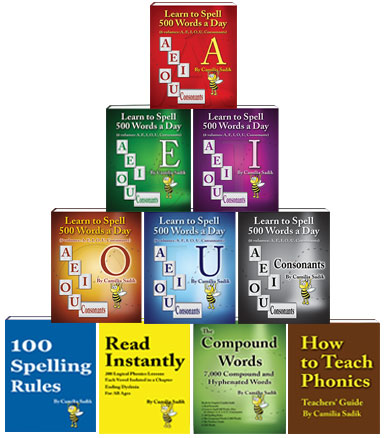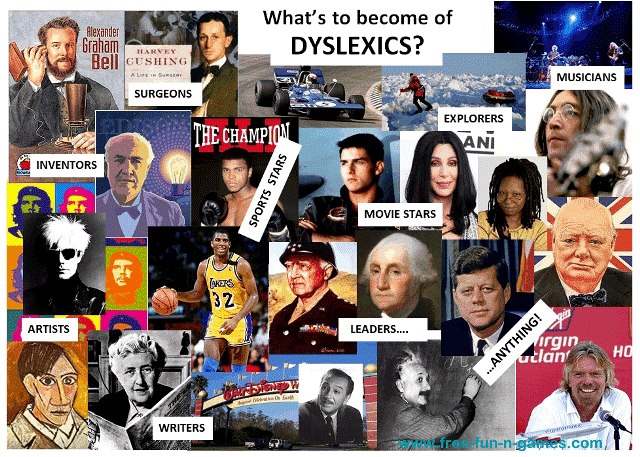How do you get dyslexia in spelling? Dyslexia in spelling is given to kids before the 4th grade. Forced speed-reading before learning to spell causes kids to see and then write letters in reverse.
The Six Steps to getting Dyslexia in Spelling and Reversing Letters
Step 1: Logical Learners become Poor Spellers
Cannot Memorize without Logic: Logical learners like, Albert Einstein who could not spell, are born with a brain that is wired to require logical explanations before they can memorize anything. Their learning style is a logical learning style and to them, the spelling of English words is illogical. They are so logical; they expect to see “My cat is cute.” to be “Mi kat iz qut.” If no logical explanations or spelling rules are provided, logical learners (analyzers) cannot memorize the spelling of English words and they become poor spellers.
Why can’t we spell: The reason most of us can read but cannot always remember the spelling of the words that they read is that one English sound can be spelled in many different ways. Typically, logical learners are the ones who ask for spelling rules to know when to spell a sound one-way and not the other. If no spelling rules are provided, logical learners simply cannot memorize the spelling of English words and some of them cannot read at all.
Two Types of Learners: Logical children who only know the ABC’s are usually shocked when a great number of sentences like, “My cat is cute.” are randomly thrown at them to read, without any logical structure (whole language). They wonder WHY they were told one thing when they were learning their ABC’s and then expected to read or write another. It is this big WHY that makes a huge difference between the two types of learners, who are born with two different wiring systems in their brains. It is because of this big WHY that logical learners (analyzers) fall behind in class while memorizers are reading and spelling at a faster pace.
Step 2: Too Young to Form Complex Linguistic Questions
Because they are so young, children with a logical learning style (analyzers) cannot form all the complex linguistic questions they wish to ask about the illogical way words are spelled. They may wish to ask their teacher:

Because they are so young, children with a logical learning style (analyzers) cannot form all the complex linguistic questions they wish to ask about the illogical way words are spelled. They may wish to ask their teacher:
Why the “q” sound is spelled with a “cu” in “cute”?
Why the “i” sound is spelled with a “y” in “my”?
Why the “z” sound is spelled with an “s” in “is”?
Why the “k” sound is spelled with a “c” in “cat”?
Why the “k” sound is spelled with a “c” in “cat”?
Why “My cat is cute.” is not simply “Mi kat iz qut.”?
Eventually, they become too overwhelmed with the number of questions they wish to ask, and then they decide to keep their mouths shut and put the blame upon themselves.
Step 3: Falling Behind in Class
As a result, logical children continue to fall behind in class, and no one realizes why they are falling behind. No one else around them knows what they have been through; even they, themselves, lose track of what is taking place. This entire episode happens so quickly; it is like a quick nightmare that one forgets its details after waking up. Shortly after that, the commotion created around them and the worried parents lead these poor kids to believe they have some type of an innate learning problem. Before they know it, the testing specialists come to schools to diagnose them as dyslexics and / or learning disabled. Their only fault is that they are too intelligent to accept the illogical way we spell English words.
Their condition remains a mystery to them, to their teachers, to their parents, and even to the specialists who may have a PhD in dyslexia diagnostic. According to reliable statistics, 2 out of 3 people are logical learners. It is an outrage to watch our nation’s finest type of thinkers being forced to live with poor spelling and with falling behind in class. Since when was questioning, analyzing, and logical thinking a defect? In time, these poor kids fall behind, not only in reading and spelling but also in all other subjects that require reading and spelling.
Step 4: Feeling the Need to hurry to catch up with Schoolwork
Consequently, logical learners (analyzers) become aware of the need to hurry, and they read faster to keep up with their classmates who are memorizers. They feel the pressure of having to read faster coming from their school, their peers, their parents, and from society at large. They are told to try harder, and traditional educators and other literacy advocates advise these kids to speed-read, and to read more interesting stories to improve their spelling skills.
Traditional educators have no idea that these kids cannot focus on two things at a time; namely, they cannot focus simultaneously on the way words are spelled, while reading for comprehension to find the main idea.
Step 5: Forced Speed-reading before Learning to Spell Words
Traditional educators continue to ask logical kids to read more stories when these poor kids cannot yet read or spell words or certain sounds in words. Nevertheless, kids continue to try harder to read as they are told. In the midst of all this pressure, they develop the ability to speed-read before learning to spell or read words. Eventually, they speed-read without seeing the way words are spelled and they do not have the time to see inside words and differentiate words like (niece & nice), (nose & noise), (exit & exist), (untied & united), etc. They are highly focused on the main idea and don’t have the time needed to look or see the details inside the words they are reading and they have to ignore grammar. They hurry so much that their vision travels rapidly from left-to-right and from right-to-left. In their haste, they end up seeing letters and sometimes words in reverse. When they write, they hurry and write letters in reverse, in that same reversed manner they saw them.
They are in a desperate need to read slowly in order to see the way words are written. Yet, they feel forced to speed-read, and speed-reading only worsens their situation. Speed in reading or in anything is a result of a process that one can only achieve naturally; speed cannot be achieved through force. We cannot force babies to run before they can crawl or walk.
Step 6: Can Only Focus on One Thing at a Time
Poor Spelling → Dyslexia: Constantly, dyslexic persons think they have to hurry, and they become obsessed with hurrying. If dyslexia is a disorder, it is an acquired hurrying disorder that can be reversed. Even when asked to look at words and copy them, they hurry and may copy letters in reverse. They hurry more when asked to find the main idea in the story or when asked to pay attention to punctuation or grammar. Logical learners (analyzers) can only focus on one thing at a time; hence, they focus highly on the main idea but not on the way, words are spelled. And this is the story of how dyslexia is given to kids before the 4th grade.
Dyslexia in spelling and in writing letters in reverse is acquired but only by logical learners, and what causes it is lack of logical spelling rules and being compelled to speed-read before learning to spell words. Reading too fast, too soon causes persons with spelling difficulties to see letters in reverse, and eventually writing letters in reverse. Dyslexia in spelling and reversing letters is not hereditary; being logical learners is hereditary.
Teachers’ Responses
When groups of teachers were initially asked if there was anything wrong with asking all kids to read “My cat is cute.”; all agreed that there was no problem with this sentence, and that they would continue to ask young children to read more such simple sentences in children’s books. It is true that those who are visual learners born with a brain wired to memorize anything without questioning the logic behind it would learn to read and spell “My cat is cute.” However, research also revealed that these same groups of teachers were unaware that there were logical learners. Some expressed that they were aware of different learning styles but not of logical learners. Most were trained to think that the two different learning styles meant kids with or without learning disabilities. Others expressed they were aware of visual or oral learners but had not heard of logical learners. A few of the teachers who struggled with spelling themselves admitted that they had dyslexia and that this was exactly what happened to them when they were growing up; one said this presentation was like telling my life story.
Lee Learned to Read in a Week! When logical spelling rules were provided, Lee Learned to Read in a Week! Not only did Lee learn but also he learned in a week. Because he learned so quickly, Lee proved that he was NOT learning disabled. His teacher, Mr. Woods never did understand how Lee learned when prior to that he was sitting in class for six years unable to read. After Lee learned to spell, Mr. Woods expressed, “Lee seems to be calculating something before he can spell words, and I don’t care how he gets them as long as he keeps spelling them right.”
10 Phonics and Spelling Books or E-books

1. Read Instantly (200 Logical Phonics Lessons) Amazon $52 — or — Our Price $45 — or — Special Offer
2. Learn to Spell 500 Words a Day (6 volumes) Amazon $52 each — or — Our Price $45 each — or — Special Offer
10 e-books are available for all e-readers and free apps
See the e-books on →Kindle Store
Here’s what our satisfied clients say:
“Now, I know how to spell. Spelling is easy. Ask me any words, and I will spell them.” B.J.’s father said, “My son is learning the spelling of thousands of words everyday and his vocabulary is increasing.” A year later, B.J. and his father expressed that he was one of the best students in his class. B.J. said, “I get straight A’s in every class Ms. Camilia.” B.J. Penick, age 13, grade 8 http://charterschool-sandiego.net/


